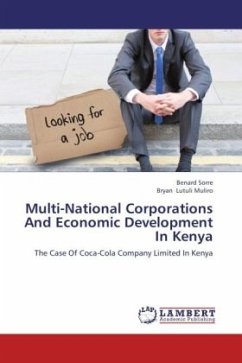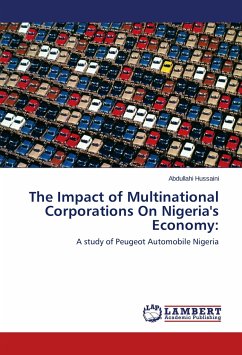
Multi-National Corporations And Economic Development In Kenya
The Case Of Coca-Cola Company Limited In Kenya
Versandkostenfrei!
Versandfertig in 6-10 Tagen
39,99 €
inkl. MwSt.

PAYBACK Punkte
20 °P sammeln!
The role of Multinational Corporations (MNCs)in the transition economies has generated heated debate since the end of the Second World War. Dependency, structural, and neo-liberal theorists have come up with arguments that either support the MNCs or condemn their nature of engagement in the transition economies. Developing countries are faced by many challenges ranging from high unemployment rate, civil wars, diseases, hunger, inappropriate technology, poor leadership, and corruption that make these countries remain in abject penury and underdeveloped. Hence, the book sets to assess how the MN...
The role of Multinational Corporations (MNCs)in the transition economies has generated heated debate since the end of the Second World War. Dependency, structural, and neo-liberal theorists have come up with arguments that either support the MNCs or condemn their nature of engagement in the transition economies. Developing countries are faced by many challenges ranging from high unemployment rate, civil wars, diseases, hunger, inappropriate technology, poor leadership, and corruption that make these countries remain in abject penury and underdeveloped. Hence, the book sets to assess how the MNCs in Kenya, based on the experience of coca cola limited company, have attempted to intervene in some of these problems by fostering economic development either directly or indirectly.












